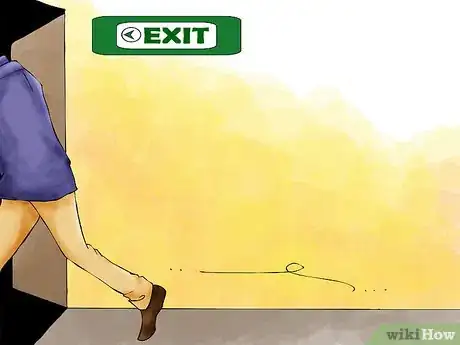This article was co-authored by Maureen Taylor. Maureen Taylor is the CEO and Founder of SNP Communications, a leadership communications company based in the San Francisco Bay Area. She has been helping leaders, founders, and innovators in all sectors hone their messaging and delivery for almost 30 years, and has worked with leaders and teams at Google, Facebook, Airbnb, SAP, Salesforce, and Spotify.
There are 16 references cited in this article, which can be found at the bottom of the page.
wikiHow marks an article as reader-approved once it receives enough positive feedback. This article received 19 testimonials and 100% of readers who voted found it helpful, earning it our reader-approved status.
This article has been viewed 668,168 times.
Arrogant people seem to think that they know everything. If you let them, they can really get on your nerves or let you down and keep you there. Rather than getting upset, sad or depressed, it's better to find an approach that works well with you to coping with the arrogance and comments of the people who obviously are so full of themselves and make sure it effectively works with your personality.
Steps
Understanding Your Own Sense of Security
-
1Enter an encounter with an arrogant person with the strong and confident realization that you are well and strong. When you feel sound within your own self, there is nothing an arrogant person can say or do to undermine you. Your sense of confidence and self-worth will prohibit you from being vulnerable to an arrogant person. The arrogant person may be unable to relate to you and might even say obnoxious or cruel things but you can let it slide when you feel secure in yourself.
-
2Use the encounter as an opportunity to improve your own listening skills or tolerance. Perhaps your weakness is impatience, frustration, or annoyance. Perhaps you feel intimidated. Try to flip your usual negative approaches upside down and treat this as a learning opportunity in which you seek to listen without judging. Aim to tolerate the person, seeking to understand what motivates him or her, and how you might feel in the same position. Of course, there is no place for excusing bad behavior but at least you can listen with an open mind––you might just surprise the arrogant person.Advertisement
-
3Consider the ways in which you interact with other people. Do you assert yourself, or are you a people-pleaser; a grouch; or a timid mouse? Arrogant people look for those who won't assert because they like to push people around or press their buttons. If you have difficulties in this area, you may wish to improve your assertiveness as well as learning how else to respond to arrogant types.[4]
Spotting and Understanding the Arrogant Person
-
1Assess the situation. Why do you feel that a person is being arrogant? Have they been condescending to you or have they never spoken to you? If there has not been an incident that showed you this person feels superior to you, don't assume he or she is arrogant too quickly. You might wrong him or her.
- If you feel that your interests and needs are not being respected at all, this can be a sign of dealing with an arrogant person, especially where he or she insists that his or her way is the only way.
-
2Listen to their conversation. Is it always about them? Do they get mad or irritated if the center of attention moves to someone else? Boasting, dismissing others, and behaving as if they know everything is a sure sign of an arrogant type. Interrupting conversations or breaking off abruptly are other signs of arrogance when talking.[5]
- Look for the person constantly saying that they are better than you and other people. It may be subtle or overt but you'll certainly know of it.
- Consider how dismissive the person is towards you and your ideas or thoughts. Dismissive attitudes signal a belief in being better than others.
- Does this person put down the things you care about, especially in public?
- Does this person sound and/or act plain bossy? Listen for a tone of voice that indicates bossiness and a dismissive attitude.
- Does this person even notice when you are bored with the conversation? Arrogant people never notice this!
-
3Consider whether you're included or excluded in decision-making with this person. Arrogant people rarely include others in decision-making because they're certain that they're right and already have the answers. Of even less concern is whether or not the decision impacts you.
- Does this person try to hang around with, work with, or conspire with people of high status? This is because the arrogant person believes he or she is only worthy of those with high status.
-
4Be aware that arrogant people are often quite insecure. Through seeking to dominate and control, they feel in control, a reflection of their big fear of being dominated and controlled. The arrogant person finds it hard to admit being wrong and no matter how preposterous, will often cling to a belief that he or she knows things even when the knowledge is outdated or fails to take into account broader perspectives. Sadly, many arrogant people actually have less life experience than their pretense; it's all a big cover up embellished by imagination and envy.[6]
- Being a snob is a classic sign of arrogance. Pretending or even actually knowing as much as possible about something thought to be exclusive gives the arrogant person the upper hand and he or she isn't afraid to show off.
- It is very difficult for an arrogant person to understand complexity. He or she is much happier with predictable, black and white situations and tends to see all of life with such a view. This can cause the arrogant person to assume a lot and know very little.
- Anxiety can bring about a sense of arrogance without a real intention to treat you as inferior. In this case, the anxious person is simply overwhelmed by seeming inadequate in a conversation and tries too hard to be clever. This can end up sounding superior and, if coupled with dominating the conversation, can seem arrogant. Be careful to look more deeply before you judge the person's motivation. An anxious person will be interested in your responsiveness, while an arrogant one couldn't care less and won't ever apologize for talking too much.
Dealing Effectively With Arrogance From Others
-
1Don't let it get to you. This can be easier said than done but by ignoring the practiced superiority, it's knocking down the whole purpose of the behavior. Be charitable in interpreting this person's obvious exaggerations and assumptions and try to find ways to excuse some of the big talk (especially if it's a relative or someone you see regularly). Probe for what you can enjoy about the encounter––among all of the fluff, there probably is something worth knowing or exploring more deeply together. Maybe this person is good for a story or is charming in spite of the evident snobbery.[7]
-
2When meeting someone new for the first time, it is always best to give him or her the chance to reveal his or her true nature fully. This means listening attentively and allowing the other person to speak freely. Be polite and acknowledge what is said without trying to engage any more deeply. As the person talks, his or her personality will be exposed and you'll find it's either friendly and equitable or mired in insecurity and therefore likely to bring up a range of irritating behaviors.[8]
- If, for expediency's sake, the person happens to fit the latter category (that is, unappealing and irritating), quietly plan to obtain the information you have come to seek from them or the business transaction you are obligated to complete and then resolve to quietly and quickly with the most polite tact make your exit (aka escape from their presence).
-
3Be tactful.[9] By being tactful, you can still point out things that are self-evident or down to luck rather than any person's actual skills. Discuss how much you owe to luck in life and the kindness of others. Note too, that many people do it tough in life, and how amazed you at how such people manage to thrive all the same. This gives a hint that you're not going to stand around listening to blarney about the arrogant person's amazing supernatural abilities.
-
4Change the topic of conversation. This can take the wind out of an arrogant person keen to dominate a conversation on a topic that he or she feels comfortable. If there is an attempt to return to the old topic, politely point out that you have already made known your views and return to yet another new topic. This will help to make it clear that you're not standing there all day to listen to a one-comedian show.[10]
-
5Avoid interacting much at all.[11] There are some good ways to lessen the impact of an arrogant person who is both dominating the conversation and exaggerating or intimidating as if on stage.
- Smile a lot. Say very little. Nod here and there. Refuse to be drawn in. An occasional murmur like "ah," ha," or "mmm" can be helpful. Then plan your exit.
- Laugh very loudly at a point where clearly laughter isn't right. It will baffle and gives a chance to change the topic.
- A simple one often used by teenagers is the "Really?" comment. Say it with a tone of disbelief, look the person straight in the eye, and say no more. Practice this in front of the mirror to perfect it.
-
6Disagree politely.[12] You're not a punching bag or a mirror. You are entitled to voice your opinion politely. So, take the opportunity to do in a way that simply states that there are other views, too. Stay calm and polite while doing this. For example:
- "You have an interesting point there. I've not found the same to be true in my line of work though. In my experience, X happens instead, almost 99% of the time. The other 1% is not worth the trouble to notice."
- "For sure, that's one way of looking at it. However, in my experience, I've seen things happen quite differently. For instance..."
-
7Find humor in their arrogance. This is a big one. Often, arrogant types are too self-centered to realize that others are making fun of them. Pretend that you don't understand simple concepts, and watch them swoop in and try to prove their superiority.
-
8Keep your distance if you need to keep your sanity. If you haven't found a reliable method for dealing with this person yet, do your best to stay out of his or her way. It'll buy you time to work out how to better respond, or it will simply keep you away from their annoying presence.[13]
- If you must acknowledge them, generally speaking, in a group setting you can get away with addressing the group as a whole rather than speaking to the arrogant person specifically: for example, instead of saying,"Hi there, Wendy," say, "Hi there, everyone." Also, don't ask, "How are you?" as this might evoke a rude response.
-
9If you work with a consistently rude and arrogant person, whenever you see them coming, suddenly be incredibly busy. Pick up the phone and pretend to be having a conversation. If they are specifically wanting your attention, keep them waiting for as long as you can get away with it. Have a column of figures handy to be added up three times over. When you finally do acknowledge them, do so in a distracted, brisk, impersonal way whilst commencing yet another task. For example, say something, such as, "Right, what can I do for you," as you pick up the telephone receiver. This technique often works very successfully because you are, in effect, "putting the arrogant person in their place." This is the opposite of what they want.
-
10
-
11Stay polite at all times.[16] Manners will spare you from looking like the bad person in all of this. It'll be clear that you've tried and that you're patient. But it will also be clear that you don't tolerate fools either.
- Once you have left their spirit-robbing presence, you can pride yourself on your professionalism, your intelligent awareness of the dynamics, and your presence of mind to escape quickly without wasting another valuable minute around such a spirit-robber. They on the other hand will be left with a profound surprise of having had such a pleasant encounter with a truly stable and mannerly individual and will feel "like a heel" in comparison, knowing that their rude arrogance will have no effect on you and that they cannot control you, hurt you, anger you or destroy you with their dark spirits that they themselves seem unable to control or resist within themselves.
Community Q&A
-
QuestionHow do I deal with an arrogant person who has a group of people supporting him that aren't arrogant?
 Community AnswerIgnore that arrogant person and the group. If that group decides to follow that arrogant person, then their common sense is obviously not kicking in yet or at all.
Community AnswerIgnore that arrogant person and the group. If that group decides to follow that arrogant person, then their common sense is obviously not kicking in yet or at all. -
QuestionWhat can I do if I think I might be arrogant?
 Community AnswerThinking you might be arrogant is a good first step. Stop talking about yourself and assuming you are always right. Maybe other people are right too/instead of you. Let other people talk and voice their own opinion. Don't make fun of people. Let the conversation flow successfully.
Community AnswerThinking you might be arrogant is a good first step. Stop talking about yourself and assuming you are always right. Maybe other people are right too/instead of you. Let other people talk and voice their own opinion. Don't make fun of people. Let the conversation flow successfully. -
QuestionHow do I deal with a bitter parent?
 Community AnswerTry not to take it personally. The problem lies with the parent. Be a patient son/daughter and try to still show love. Limit interactions if it brings you down. Try to understand your parent's life.
Community AnswerTry not to take it personally. The problem lies with the parent. Be a patient son/daughter and try to still show love. Limit interactions if it brings you down. Try to understand your parent's life.
Warnings
- Ignoring an arrogant person may be effective in getting them to leave you alone, but recognize that arrogant people have a way of taking up the air in a room. So even though they're not talking to you, you may still find them annoying to be around.⧼thumbs_response⧽
- Some people may act so arrogantly that you may feel like they are being overly negative. These people tend to overestimate the value of their own existence. If this is the case, it is probably best to avoid them. If this is patently impossible (i.e. you work with them, live with them, etc.) try to be logical with them, and try to be as non-confrontational as possible.⧼thumbs_response⧽
- Try not to get into any type of debate with them, because they'll never hear your side of the story, and if they do, they will continually tell you you're wrong. Often times, arrogant people will try to make "you" feel insecure and at fault. He/she will do this in an attempt to demonstrate control over the situation. If this happens to you, do not get mad at all, that's what they want from you. Instead consciously understand their belittling actions and see their intended conclusion from their perspective. Act wise and in control, but don't escalate the situation by responding in an angry or hostile manner.[17]⧼thumbs_response⧽
References
- ↑ https://www.entrepreneur.com/article/275543
- ↑ https://www.entrepreneur.com/article/275543
- ↑ https://www.successconsciousness.com/blog/personal-development/the-benefits-of-being-a-good-listener/
- ↑ https://www.themuse.com/advice/how-to-deal-with-an-arrogant-coworker-who-drives-you-up-the-wall
- ↑ https://www.beliefnet.com/wellness/galleries/9-ways-to-handle-arrogant-people.aspx?p=3
- ↑ https://www.psychmechanics.com/2014/10/personality-traits-arrogance.html
- ↑ https://www.beliefnet.com/wellness/galleries/9-ways-to-handle-arrogant-people.aspx?p=5
- ↑ https://www.beliefnet.com/wellness/galleries/9-ways-to-handle-arrogant-people.aspx?p=6
- ↑ https://www.psychologytoday.com/us/blog/ambigamy/201407/how-be-tactful
- ↑ https://www.beliefnet.com/wellness/galleries/9-ways-to-handle-arrogant-people.aspx?p=7
- ↑ https://www.beliefnet.com/wellness/galleries/9-ways-to-handle-arrogant-people.aspx?p=8
- ↑ https://www.beliefnet.com/wellness/galleries/9-ways-to-handle-arrogant-people.aspx?p=9
- ↑ https://www.huffpost.com/entry/10-toxic-people-you-should-avoid-like-the-plague_b_591344f2e4b07e366cebb80e
- ↑ https://lifehacker.com/be-more-honest-with-people-by-thinking-of-the-truth-as-1735755932
- ↑ https://www.beliefnet.com/wellness/galleries/9-ways-to-handle-arrogant-people.aspx?p=10
- ↑ https://www.skillsyouneed.com/ips/politeness.html
- ↑ https://www.huffpost.com/entry/dealing-with-arrogant-people_b_990331
About This Article
Being around arrogant people can be frustrating, but you can cope by minimizing your involvement with them. If you see them approaching you, act busy to minimize your involvement with them. If you get drawn into a conversation with someone being arrogant, react as little as possible by saying “Right,” “I see,” or “Really?” to shut the conversation down as quickly as possible. Alternatively, change the topic of conversation at the earliest opportunity so you don’t have to hear them brag about themselves or put others down. If you want to disagree with them, try to do so politely so they don’t feel personally attacked. For example, say something like, “That's one way of looking at it. However, in my experience, I've seen things happen quite differently.” For more tips, including how to identify an arrogant person, read on!
















































































